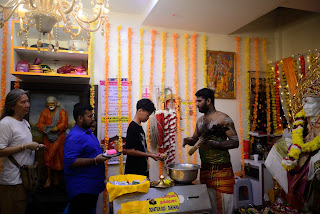 |
| The man in white shirt with a hat is my grandfather! |
It’s also marks the division
in each month between the two lunar fortnights (Paksha). The fortnight before Poornima is called as Shukla Paksha and fortnight after is called Krishna Paksha. Poornima is the day when many important festivals are celebrated, such as Guru Poornima,
Kartik Poornima, Buddha Poornima etc. across India.
 |
| The praying believers |
 |
| The praying believers |
Many people keep Poornima
Vrat on this holy day. They also take a dip in the sacred river before sunrise.
The full Moon day/night is a time when the Moon shines at its brightest glory;
illuminating everything and driving away all darkness and negativity.
 |
| The Priest (right) and a believer |
This day is considered to be a
wealthy day in Hinduism which has the ability to bring prosperity and the lives
of people. Devotees also worship Lord Shiva and Lord Vishnu on this day. Poornima
is considered to be an ideal day to keep Poornima Fast for the entire day when
devotees should not eat anything. Although, if it is unavoidable to stay
hungry, devotees may eat fruits or other light things free from cereals, salt and pulses.
 |
| The Priest and me! |
I and my grandfather joined a Poornima festival in Malaysia 2 weeks ago. When we took a walk on Kuala Lumpur street, we saw a house full of
many Indians. It was well decorated with lights. The believers were welcome us to join but we had to
take off our shoes before stepping into the house. There, people ate Indian
cakes, doing worships. The Priest held a bamboo broom and whip against the prayers' shoulders and gave them an apple and two pieces of cakes as a blessing.
 |
“The Indian Moon cake”and World Cup!
Buddists and maybe Confucianisists (Confucianism also known as Ruism) in Vietnam and China also worship to Buddhas or Gods on first day of Lunar month and on the day of full moon. So, we could easily share the religious view about this festival.
Bài viết rất hay!
ReplyDeleteCháu viết hay quá. Đọc các bài viết của cháu giúp cô hiểu thêm về phong tục tập quán địa phương nơi cháu từng đi qua. Cảm ơn cháu nhé 😘
ReplyDelete